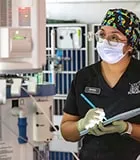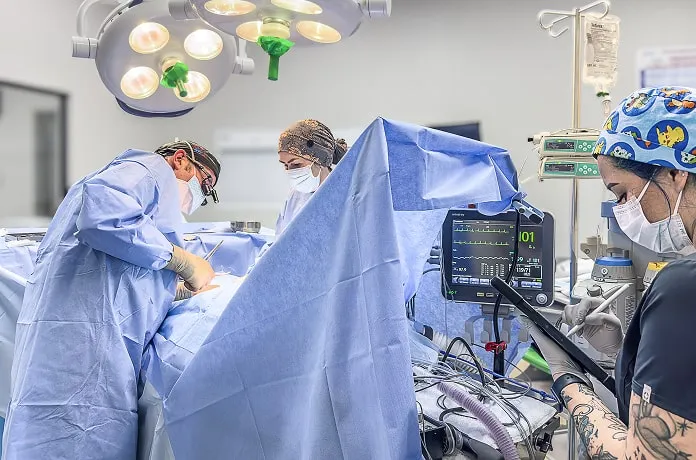Pet Surgery
Preparing Your Pet For Surgery
Preparing your pet for surgery can be stressful, even when you have time to plan ahead. A little preparation now makes surgery day- and recovery - much easier.
From setting up a quiet space to planning your pet’s first meal after surgery, being ready helps everything go more smoothly. We’ve outlined the key points below, and remember - SurgiPet offers support 7 days a week if you have any questions.

The Week Prior
One week before your pet’s surgery might feel early to start preparing, but it’s the perfect time to get ready for the big day - and for a smooth recovery after.
Start by determining how you will transport your pet to and from the hospital. We recommend that your pet be transported in a crate or lying down on the seat or floor while an adult parent holds onto it. We don’t want a recovering pet standing up or moving around.
This is also the time to prepare your home for recovery. Getting your dog’s crate or gates set up, moving dishes closer to their bedding, buying their favourite treats to help with giving medications, and preparing a bland diet for the first few meals are all good preparation steps. You might also want to wash your dog’s bedding to lower the risk of infection.
Lastly, make sure to set up a comfortable bed where your pet can rest after surgery. Your pet will not be allowed to jump on or off furniture during recovery, so their bedding must be placed directly on the floor. Keep in mind that the squishiest bed may not be the right one for your pet. Fluffy beds make it more difficult for your pet to get in and out.
Memory foam covered with a washable blanket provides comfort as well as warmth. You might also want to have an extra blanket handy if you pet likes to be covered. A little preparation now can make all the difference in helping your pet feel safe, supported, and comfortable during recovery.
The Night Before
Write out a list of your pet’s medications and supplements to share with our veterinary team. Follow a regular exercise routine.
In order to minimize the chance of regurgitating undigested food and liquids, your pet needs to have an empty stomach for most procedures. During anesthesia, normal reflexes are suspended, so your pet’s defenses aren’t working.
For example, the lungs usually have protection against undigested food, but when your pet is anesthetized, the protective properties don’t work.
For your pet’s safety you may be told to fast (no food or liquids) him/her before surgery.
It is critical that you follow these instructions carefully about fasting and medications; if not, it may be necessary to postpone surgery.


Fasting Guidelines:
✔ Up to 8 hours prior to the scheduled start of your pet’s anesthetic/ procedure, your pet may consume any type of meal.
For puppies & kittens 8 weeks and younger a small portion of soft food (such as canned puppy/kitten food or plain cooked chicken) may be given up to 4 hours before the scheduled start of the anesthetic/procedure. Dry kibble is not allowed.
✔ Up to 1 hour prior to the scheduled start of the anesthetic/procedure your pet may be given free access to water.
✔ Up to 4 hours prior to the scheduled appointment time oral medications may be administered. They can be given with a small amount (1-2 tablespoons) of wet food or pills coated in an edible paste.
✔ Please contact us for specific instructions if your pet weighs less than 2kg.
✔ If your pet has a history of regurgitation, is at risk for it, or has diabetes, please contact us for specific pre-surgery instructions.
The Morning Of
The most important thing you can do the morning of your dog’s surgery is make sure they do not have access to food. Eating could cause your dog to aspirate during anesthesia, which is potentially life-threatening.
Some medications may need to be stopped before surgery. List all medications your pet is taking when you fill out the New Patient Information Form. It is extremely important to discuss all medications your pet is taking with the surgeon and anesthesiologist prior to surgery. The following are general guidelines for some common medications administration prior to anesthesia.
- Thyroid medication: thyroid supplement or Methimazole
- Opioid pain medications (examples: Tramadol, Codeine)
- Anti-anxiety medication such as Trazodone, and Gabapentin
- Cardiac medications: Pimobendan, Furosemide
- Antibiotics
- Steroids
- Gastrointestinal medications (Metoclopramide, Cisapride, Cerenia, Zofran/Ondansetron)
- Antihypertensive medications, especially ACE inhibitors: Enalapril, Benazepril
- Non-steroidal anti-inflammatories (examples: Carprofen, Meloxicam, Galliprant)
- Anticoagulants (examples: Aspirin, Clopidogrel)
- Dietary Supplements (examples: Minerals, Vitamins, Herbal and Holistic Supplements)
- CBD and marijuana-based medications
After The Surgery
In most cases your pet will return home the same day. Here are a few things to consider to help your pet’s recovery process:
- Your pet will be discharged fully awake and able to walk unless your pet’s injury prohibits mobility. They will recognize and respond to you.
- It is best to arrange to have a responsible adult with your pet for the first 24 hours after surgery.
- Provide them with a comfortable, quiet place near you to rest.
- Give your pet adequate time to rest and recover. Most pets need 4-5 days to fully recover from the effects of anesthesia and surgery. During this time they will look tired and have less appetite.
- Offer your pet food and water when they arrive home. It is perfectly normal for them to refuse both food and water the night after surgery.
- Your pet should urinate the night of surgery or the next morning. Please contact us immediately if there is no urination within 18 hours of going home.
- Always use an E-collar or Lick Sleeve to prevent your pet from damaging the incision and causing infection. E-collars typically must be worn for a full 2 weeks.
- Minimize discomfort by giving pain medication as directed by the surgeon. To avoid nausea, do not give these medicines on an empty stomach. Use small treats or paste-like foods to help.
- Our team will provide written discharge instructions with additional guidance.


I Still Have Questions – Now What?
Should you have questions, do not hesitate to call or email our team for more information. We are available 7 days a week.

